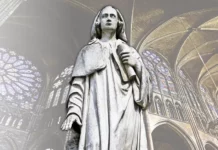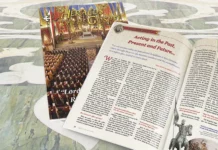To be an apostle is a vocation that extends to all times and places. But how can we differentiate between the true and the false apostle? The Second Letter to the Corinthians offers us some valuable criteria.
To be an apostle is not something exclusive to the early period of the Church, but rather a vocation that extends to all times and places. Otherwise, it would not be possible to fulfil the Divine Master’s command: “Go into all the world and preach the Gospel to the whole creation” (Mk 16:15).
However, alongside these authentic envoys of God, there are always those who present themselves as such, but in reality are ravenous wolves who seek to destroy Christ’s flock (cf. Mt 7:15).
This sad reality and its consequences were foretold by Our Lord Himself: “many false prophets will arise and lead many astray. And because wickedness is multiplied, most men’s love will grow cold” (Mt 24:11-12).
It is therefore very important to know how to discern the true apostles from the false ones. How can we do this?
The Second Letter to the Corinthians and the figure of the apostle
The Second Letter to the Corinthians is one of St. Paul’s richest writings. The circumstances surrounding it, its intended recipients, and even the pastoral problems that motivated it make it shine as a “passionate unburdening of the heart of the great Apostle, a vigorous defence of his apostolate in response to the calumnies raised against him.”1
In the epistle, the Doctor of the Gentiles draws a contrast between himself and the “false apostles” who sought to undermine his work. It is therefore easy to detect, throughout this biblical text, the characteristics of the true ambassador of Jesus Christ. Let us consider some of them.
Chosen by God
“Paul, an apostle of Christ Jesus by the will of God” (2 Cor 1:1).
In the very first words of his epistle, St. Paul points out his vocation: apostle of Christ Jesus. This is his identity, his credentials, his definition.
However, another truth is clearly manifested in the sacred text: he receives his mission directly from God. It is by the divine will that man is raised to the very high condition of being sent by the Lord. It is a gift, a grace that no human force can grant or usurp.
Sign of contradiction
“For we are the aroma of Christ to God among those who are being saved and among those who are perishing, to one a fragrance from death to death, to the other a fragrance from life to life” (2 Cor 2:15-16).
Even while being an emissary of God, the true apostle does not enjoy the acceptance of all. Some regard him as a bearer of death. He is a sign of contradiction! His listeners will be compelled to take a definitive attitude: to accept or to reject. Acceptance will come with admiration; rejection, with hatred.
Such a trait would seem inconsistent and even contradictory with the apostolic mission, which aims at saving the greatest number of souls; however, it is not. Wanting the salvation of all does not automatically bring as a consequence that all will want to be saved.
For those who have little concern for their own eternal destiny, the figure of the apostle becomes unbearable. This is what St. John Chrysostom explains, commenting on the passage quoted above: “He who is on the path of perdition can only reproach himself. Pigs are said to be suffocated by perfume, and light, as I have said, blinds unhealthy eyes. Such is the nature of good things: it not only heals what is like it, but it destroys what is contrary to it; in this way its power is shown to be very strong.” 2
Apostle of Christ or servant of Belial?

“Do not be mismated with unbelievers. For what partnership have righteousness and iniquity? Or what fellowship has light with darkness? What accord has Christ with Belial? Or what has a believer in common with an unbeliever? What agreement has the temple of God with idols?” (2 Cor 6:14-16).
Here is another fundamental characteristic of the true apostle of Jesus Christ, clearly stated by St. Paul: integrity!
Those who have received this calling must guard against actions that undermine it; accordingly, they must be aware that, on the path of fidelity, there is no room for iniquitous compromises.
In preferring tolerance to intransigence against evil, the false apostle wishes to fabricate a pretended compatibility between Christ and Belial, between Light and darkness, between God and idols.
Infidelity is an unmistakable mark of one who is not an authentic envoy of God. Moreover, it clearly distinguishes a servant of Belial, since anyone who does not show himself to be upright in the service of God deserves to hear the words of the Divine Teacher: “He who is not with Me is against Me, and he who does not gather with Me scatters” (Lk 11:23).
St. Irenaeus of Lyons pronounces a severe judgement on this type of person: “As for those who pass for presbyters in the eyes of many, but are slaves to their passions, who do not put the fear of God above all else in their hearts […] and do evil in secret, saying ‘no one sees us,’ they will be rejected by the Word, who does not judge according to opinion and does not look at appearance but at the heart, and they will hear these words spoken prophetically by Daniel: ‘Race of Canaan and not of Judah, beauty has fascinated you and passion has perverted your heart. Man grown old in evil, now appear the sins you once committed, uttering unjust judgements, condemning the innocent and setting the guilty free, when the Lord said: You shall not cause the innocent and the just to die.’”3
Persecuted by “false apostles”
“And what I do I will continue to do, in order to undermine the claim of those who would like to claim that in their boasted mission they work on the same terms as we do. For such men are false apostles, deceitful workmen, disguising themselves as apostles of Christ. And no wonder, for even Satan disguises himself as an angel of light. So it is not strange if his servants also disguise themselves as servants of righteousness. Their end will correspond to their deeds” (2 Cor 11:12-15).
This is one of the many passages in which St. Paul insinuates that he is being persecuted.
The Corinthian community – for which the Apostle shed tears of love (cf. 2 Cor 2:4) – began to charge him with various unfounded and slanderous accusations. Numbering among them are: that he did not belong to Christ, that he was a corrupter of communities, that he invaded the territory of others and that he even suffered from schizophrenia (cf. 2 Cor 10:1-14)!4
How can it be explained that the very people to whom St. Paul had dedicated himself so much could have rebelled in such a vile way? A contemporary exegete answers: “The Corinthians did not formulate these accusations against Paul on their own. Behind them are those whom the letter calls, with a good dose of irony, ‘super-apostles’. Who are they? Certainly influential persons, representatives of the central hierarchy that imposes itself on the community.”5
In face of persecution, do not flinch, but fight!

On the other hand, the Apostle’s response to slander is moving! The true messenger of Christ must never allow himself to be overwhelmed by the persecutions he suffers, whether external or internal, even when they come from those who have been the object of his greatest kindness, dedication and hope.
The means employed by St. Paul to overcome the difficulties encountered on the path of evangelization were to defend himself fearlessly and with confidence in the Almighty, removing every pretext from dishonest workers (cf. 2 Cor 11:12-13). This made him a truly majestic man.
In this regard, Pope Benedict XVI wisely ponders: “How can we not admire a man like this? How can we not thank the Lord for having given us an Apostle of this stature? It is clear that he would not have been able to face such difficult and, at times, desperate situations if there had not been a reason of absolute value, before which no barrier could be considered insurmountable. We know that for Paul, this reason is Jesus Christ.”6
Apostle of the “secrets” of God
“I must boast; there is nothing to be gained by it, but I will go on to visions and revelations of the Lord. I know a man in Christ who fourteen years ago was caught up to the third Heaven – whether in the body or out of the body I do not know, God knows. And I know that this man was caught up into Paradise – whether in the body or out of the body I do not know, God knows – and he heard things that cannot be told, which man may not utter” (2 Cor 12:1-4).
In theology, mystical, extraordinary or supernatural phenomena, such as the one recounted by St. Paul, are considered gratis datæ, that is to say, gifts that God freely grants to whom He pleases. They are reserved for the few; indeed, many Saints never received them. Nevertheless, it must be borne clearly in mind that every baptized person should nourish an intense interior life – mystical in the deepest sense of the word – and this is an indispensable condition for any pastoral action. No apostle can excuse himself for not cultivating and fostering contemplation.7
Nevertheless, this does not mean that these phenomena are always fortuitous. On the contrary, many of them are a result of the intense degree of spiritualization attained by certain chosen souls.8

Thus, in St. Paul’s eloquent description of the revelations he has received, we find a guarantee that he is not only a bearer of the Spirit, but he also enjoys great intimacy with Our Lord Jesus Christ. God often reveals Himself mystically to the apostle in order to make him, in an even more evident manner, His emissary.
“Apostle of Jesus Christ and herald of the truth”
The text of the Second Letter to the Corinthians goes on to list other qualities that distinguish the true apostle from the false, such as unpretentiousness (cf. 2 Cor 12:14), sincerity (cf. 2 Cor 1:12-14), and being a minister of the Spirit rather than of the letter (cf. 2 Cor 3:5-6). However, the limits of this article prevent a more extensive analysis.
In any case, the character of the authentic evangelizer is outlined with unique clarity in the epistle, whose central idea consists in the defence of the Pauline ministry. In the words of a renowned exegete, its common thread can be defined thus: he is an “Apostle of Jesus Christ and herald of the truth, with all the difficulties and all the glory that this entails.”9
Glory: a sweet-sounding word to everyone’s ears. Both the true and the false apostle seek it untiringly.
For the latter, glory translates into deceit, opportunism and hypocrisy. For the former, however, it means putting on Jesus Christ, considering oneself an instrument placed in the Lord’s hands. An instrument that is at times weak; but, paradoxically, from this weakness Our Lord Jesus Christ manifests all His strength and power (cf. 2 Cor 12:10). ◊
Notes
1 PEIFER, OSB, Claude J. Conoce la Biblia: Nuevo Testamento. Primera y Segunda Epístola de San Pablo a los Corintios. Santander: Sal Terrae, 1966, v.IX, p.106.
2 ST. JOHN CHRYSOSTOM. Omelie sulla Seconda Lettera ai Corinzi, 5, 2. In: ODEN, Thomas C.; BRAY, Gerald (Ed.). La Bibbia commentata dai Padri. Nouvo Testamento: 1-2 Corinzi. Roma: Città Nouva, 2014, v.VII, p.276.
3 IRENAEUS OF LYONS. Contra as heresias. L.IV, c.26, n.3: SC 100, 721-723.
4 For a more detailed explanation of these and other attacks against St. Paul, see: BORTOLINI, José. Cómo leer la Segunda Carta a los Corintios. Los agentes de pastoral y el poder. Santafé de Bogotá: San Pablo, 1998, p.22-24.
5 BORTOLINI, op. cit., p.25.
6 BENEDICT XVI. General Audience, 25/10/2006.
7 The importance of contemplation for the perfect development of the life of the apostle is clearly explained in: GARRIGOU-LAGRANGE, OP, Réginald. Las tres edades de la vida interior. 3.ed. Buenos Aires: Desclée de Brouwer, 1950, p.1075-1082.
8 Cf. ROYO MARÍN, OP, Antonio. Teología de la perfección cristiana. 6.ed. Madrid: BAC, 1988, p.886.
9 TURRADO, Lorenzo. Biblia Comentada. Hechos de los Apóstoles y Epístolas paulinas. Madrid: BAC, 1965, v.VI, p.460.







